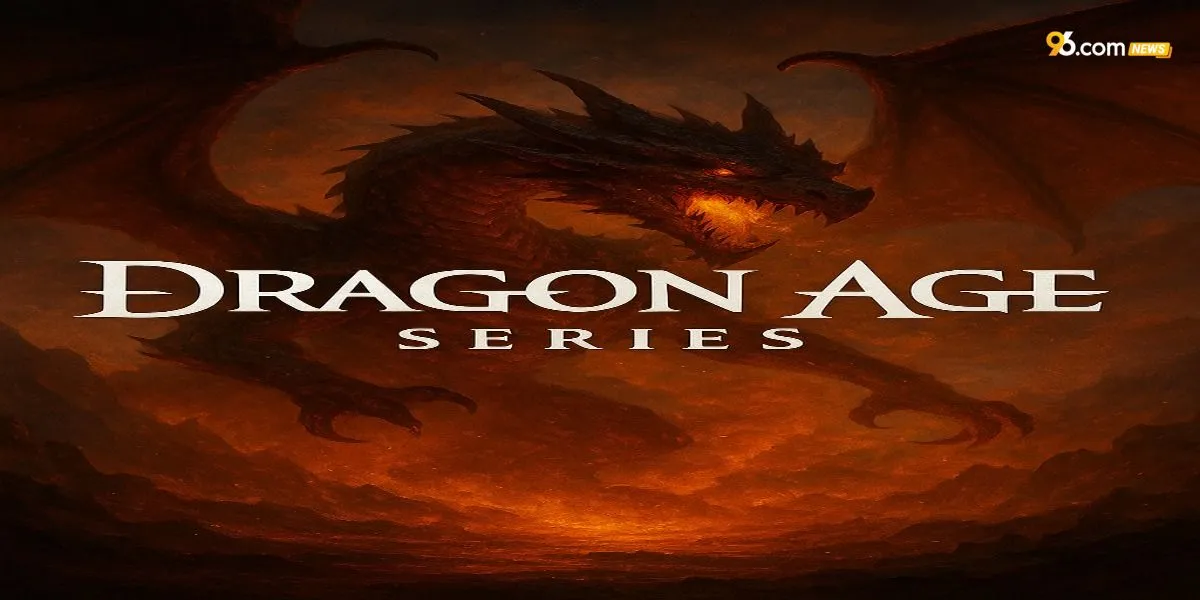Dragon Age Series: Play the Dragon Age Epic RPG Adventure
One of the most iconic role-playing franchises of the modern gaming industry is the Dragon Age series. The series has a huge fan base worldwide and is known for its rich storyline, convoluted characters, and world-building that makes the world seem lifelike. The Dragon Age game series, created by BioWare and released by Electronic Arts, combines fantasy worlds, strategic battles, and storytelling, with the choices of the player. On 96.com, where entertainment and games are at its heart, the Dragon Age series has a distinguished position as an example of how role-playing games (RPGs) could turn into a long-running franchise. This guide will focus on the roots, mechanics, plot, and chronology of the Dragon Age series of games, thereby making them easier to follow for both a new player and an old one.

What Is the Dragon Age Series?
Dragon Age is a video game franchise of role-playing and fantasy video games developed by BioWare. The setting is in the fictional world of Thedas, a continent ridden with kingdoms, magic, religion, and politics. They allow players to be in control of modifiable heroes who can influence the surrounding world by making decisions and forming alliances.
The series emphasizes:
- Moral choices in a story-based gameplay.
- Friends who intervene in the story.
- Tactical warfare, which combines magic, melee, and long-range shots.
- Massive fantasy, with dragons, demons, and other magical beings.
To summarize, the Dragon Age series is a mixture of classical fantasy and contemporary gaming that keeps the players entertained like SkillClash.
Origins of the Dragon Age Game Series
Dragon Age was originally developed by BioWare, the producers of Mass Effect and Knights of the Old Republic, in the early years of the 2000s. BioWare was hoping to make a spiritual successor to Baldur the Gate, another successful RPG franchise.
- The starting point was Dragon Age Origins (2009). It presented players with Thedas and allowed them to influence the results with decisions.
- The game was developed by BioWare based on its own lore and mythology instead of using existing universes such as Dungeons and Dragons.
- It was about dark fantasy, which consisted of political drama, war, and supernatural threats.
This background inspired the rest of the games to come where successive titles broadened the world and the storytelling options, much like Warcraft III.
Why are the Dragon Age Series Games Fan Favorites?
The Dragon Age series games are not only popular in terms of fighting but also in terms of high-quality storytelling and replay value. There are various reasons why fans give the franchise important love:
- Character Development: Each sidekick possesses his/her own back story, missions, and ethical orientation.
- Choices That Matter: Decisions have consequences both on a game-by-game basis, which build alliances and dictate the story.
- Wide Lore: The lore is varied and rich, starting as elven myths or the Hantry religion.
- Varied Play styles: Warrior, mage, or rogue are the different play styles that the players can select, each having their own specialized skills.
- Emotional Effect: Storylines tend to explore such themes as betrayal, sacrifice, and loyalty.
This mix has made the Dragon Age game series a replayed RPG game in the world, much like Yahoo Fantasy Sports.
Dragon Age Series Games in Order
The Dragon Age game series can be best enjoyed by knowing the release sequence and the plot.
Dragon Age: Origins (2009)
In the first game, players were introduced to the character of a Grey Warden, a warrior who vows to protect Thedas against the Blight, which is a disaster caused by the appearance of monstrous Darkspawn, which are directed by an Archdemon.
Key Features:
- Various accounts of origination based on race/class.
- Strategic combat that has a pause-and-play style.
- Decisions that affect the rulers and those who live.
Dragon Age II (2011)
It is a sequel to Hawke, a refugee, who becomes a power in the city of Kirkwall. In contrast to Origins, which covered a continent, Dragon Age II was set within a city.
Highlights:
- Fast-paced combat system.
- The story encompasses a decade of Hawke.
- Concentrate on political wrangles, mage vs. templar war.
Dragon Age: Inquisition (2014)
The series was revived on a bigger scale through an inquisition. Players were turned into the Inquisitor and were responsible for sealing a huge tear in the Veil (the barrier between the real world and the Fade).
Features:
- Massive free-world exploration.
- Powerful focus on the choice of the players.
- Fans became attached to such companions as Solas or Iron Bull.
- Multiple outlets have won Game of the Year (2014).
Upcoming Titles in the Dragon Age Game Series
The second big installment is Dragon Age: Dreadwolf, which is being developed. It is supposed to delve into the story of one of the most ambiguous characters of the franchise, Solas. The fans are anticipating graphics that are at an advanced level, more RPG, and a continuation of unresolved storylines of Inquisition.
Gameplay and Storytelling Across the Dragon Age Series
The games of the Dragon Age series provide a balance between combat, dialogue, and exploration.
Gameplay Elements:
- Combat Systems: Origins was a slow, tactical game; Dragon Age II made combat faster; Inquisition was a mix of the two.
- Dialogue Wheel: The feature, which was introduced in Dragon Age II, provides players with more dynamic answers.
- Crafting and Exploration: Inquisition introduced the creation of weapons/armor and huge areas to navigate, just like FanFight.
Storytelling:
- Some of the central themes are power struggles, racial tension, and religious conflict.
- These decisions by the players impact the destiny of the countries, characters, and friends.
- Several enclosures add to the replay value.
It is this gameplay and narrative balance that makes the Dragon Age series exceptional in comparison with other RPGs.
Dragon Age Series Game Platforms and Editions
The series has been made available on various platforms over time.
| Game Title | Release Year | Platforms Available |
| Dragon Age: Origins | 2009 | PC, Xbox 360, PlayStation 3 |
| Dragon Age II | 2011 | PC, Xbox 360, PlayStation 3 |
| Dragon Age: Inquisition | 2014 | PC, Xbox 360, Xbox One, PlayStation 3 & 4 |
| Dragon Age: Dreadwolf | Upcoming | PC, PlayStation 5, Xbox Series X/S (expected) |
This expansive platform coverage will guarantee that the Dragon Age series reaches old and new generation players.
Tips for New Players of the Dragon Age Series
In case you are a newcomer to the Dragon Age series of games, the following tips should help you enjoy it:
- Begin with Origins: It offers the background of lore and mechanics.
- Class Experimentation: Every class (mage, warrior, rogue) has a different experience.
- Interact with Friends: By forming new connections, one opens up new plots.
- Play Mods on PC: Mods beautify the appearance, play, and add fan-created features.
These actions will allow one to experience the full richness of the Dragon Age series game universe.
Conclusion
Dragon Age is not merely a collection of RPGs but a narrative work of art that helps players create their own fates within a well-developed fantasy world. From Dragon Age: Origins to the future Dragon Age: Dreadwolf, the franchise has expanded in size, graphics, and sophistication.
Dragon Age is one of the best franchises to consider if the player loves immersing themselves in the world of RPG, tactical battles, and storylines. Similar to the spirit of role-playing, players can discover such deep and engaging content on 96.com.
Dragon Age Series FAQs
1. Which Dragon Age series game should I play first?
Players are advised to begin with Dragon Age: Origins, which presents some of the most important characters, lore, and events that influence subsequent games.
2. Is the Dragon Age series connected story-wise?
The Dragon Age series is, yes, interconnected. The decisions made in one game may influence what happens in the next, and this forms a continuity.
3. Are there spin-offs in the Dragon Age game series?
Admittedly, smaller productions such as Dragon Age Journeys (an online game) and novels/comics that elaborate on the lore do exist.

